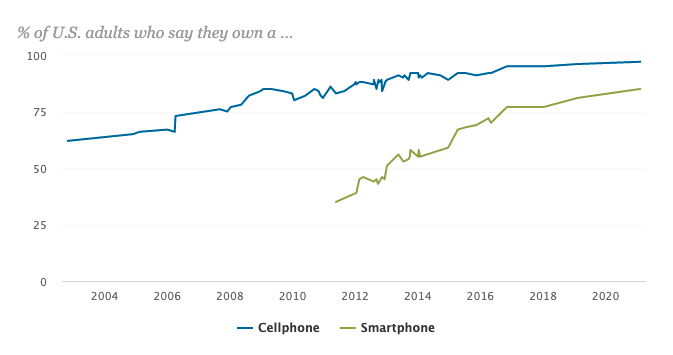7 Ways E-Commerce Grocers Can Use Push Notifications to Grow Sales
Sometimes, it’s not about getting customers’ attention—it’s keeping it. One of the best ways to achieve this today, is using SMS marketing. Roughly 85% of American adults owned mobile phones in America in 2021.
In 2020, roughly 294 million people owned smartphones, with an expected increase to 311 million by 2025. So if you’re searching for ways to keep your grocery store top of mind, why not consider mobile push notifications?
This delivers your messages directly to the customer’s smartphone anytime—no need to have your grocer e-commerce app open. It’s “direct mail” at its finest, yet it’s widely underused by grocers.
You can change this today. Here’s a look at how you can use push notifications to improve customer engagement, retention, and sales.
Why grocers should adopt a push notification marketing strategy
Push notifications aren’t just for smartphones and tablets—they also work on desktops (browser push notifications). This increases the odds of more customers seeing the messages you send. Note that push notifications get a medium of 81% of the subscriptions from mobile users.
But how effective are push notifications, anyway? Here are a few push notification stats from the Business of Apps to pique your interest:
- Push notifications increase app retention rates by 3x to 10x
- Push notification subscriptions can reach as a high as 15%
- Click-through rate for push notifications is 13% (or 30% for special offers)
- Cart abandonment notifications have a 16% click rate
- Adding a call to action (CTA) to push notifications increases campaign outcomes by 40%
- ROI for push notifications can be as high as 3500%
So not only are push notifications welcomed by loyal customers, they also increase conversion rates.
Interest piqued? Then let’s explore how you can use push notifications in your campaigns.
7 push notification campaigns to send to grocery customers
The best mobile push notification campaigns are personalized. So as you’re designing push notifications, segment them, so they appear to the right customers at the right time.
Here are different types of push notifications:
- Location-based push notifications: Send deals and coupons to customers within specific zip codes
- Loyalty programs: Use gamification to get mobile app users to stay on your app longer (e.g., send a push notification offering rewards points if they complete an online order by X date)
- Share recipes: Use customer purchase history to send personalized recipes (e.g., gluten-free, vegan, etc.)
- Personalized messages: Show customers you “see” them by sending personal messages on their birthday, along with a special deal
- Pickup and delivery updates: Keep customers informed of their orders with timely push notifications with updates about their delivery and pickup times
- Weekly promotions: Give customers a reason to shop in your stores (or online) each week by sending price cuts and discounts
- Coupons: Send virtual coupons customers can use at checkout or online shopping (QR codes) for better convenience
Got a few ideas brewing for your first push notification campaign? Then the next step is putting it all together—here’s how.
How to execute an effective push notification strategy
Push notifications aren’t about being “pushy.” So don’t overdo it with your push notification frequency. For instance, sending notifications twice per week. Also, the goal is to offer a gentle nudge in your push notification messages. Do this by sharing personalized product recommendations, shopping list ideas, and coupons for customer favorites.
You can do this and more using stor.ai, a grocery e-commerce software that brings brick and mortar grocers online.
Use push notifications to keep grocery customers engaged
Getting and keeping the attention of consumers today is challenging. But one advantage grocers have is that people have to eat—and they do so frequently. So push notifications are welcomed, especially if they come personalization and with discounts each week.
The next step is planning out your first push notification campaign and getting it sent out. stor.ai is here to help you with the latter.
stor.ai is a grocery e-commerce platform that offers a mix of tools to help grocers boost engagement, retention, and sales. If you’d like to add this to your grocery store marketing tactics, then schedule a demo with us today.

